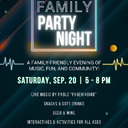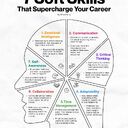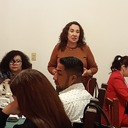-

CIFR Sonora
- 2
- 155
- 0
- 0
-

DIGITAL NAVIGATOR PROJECT
- 2
- 378
- 3
- 0
-

CCLAC SONORA-ARIZONA
- 1
- 481
- 0
- 0
-

CCLAC SONORA-ARIZONA
- 0
- 495
- 1
Elizabeth Miranda Munguia is friends with PABlo
Lubna Alyousfi is friends with Elizabeth Miranda Munguia
We're living in the strangest time in human history.
We have tools that can do 95% of human tasks better than humans.
But that last 5%?
That's where...We're living in the strangest time in human history.
We have tools that can do 95% of human tasks better than humans.
But that last 5%?
That's where ALL the leverage is.
And that 5% is:
Taste
Judgment
Decision-making
In other words, the ability to say "THIS, not THAT."
Which leads us to an exciting prospect:
The more powerful AI gets, the MORE important your decision-making becomes.
Show more
Austrian researchers discovered that all 3.5B WhatsApp users can be enumerated at a rate of 100M users per hour. The researchers used the WhatsApp Web interface to bulk add users and phone numbers and were able to extract phone numbers for all users, profile photos for 57% of users, and profile text for 27%. Meta implemented rate limiting to address this issue, but also stated that the data exposed was basic publicly available information.
How do you feel about your personal information being exposed because you continue to use WhatsApp?
Source:
www.techtimes.com/articles/312824/202511...tion.htm#cid=3254578
Read more...
I've just found out that this feature is not yet available in ChatGPT Plus. The rollout of the Group chat feature, is still just barely getting started. So, if ANYONE is interested... with the assistance of ChatGPT Agents, I was able to create a workaround for this that I'm going to be using for a few of the teams that I work with. If interested in the details, LMK so that I can share some of the steps that I took to get results.
Read more...
I’m really curious about this experiment.What jumps out at me from the article isn’t just “group chat with an AI,” it’s shared context plus shared memory of the convo for a small group of humans who are trying to get something done together.A few things I’m noticing:
- Group chats sit in their own section of the sidebar, and they’re separate from your 1:1 chats. Your personal memory doesn’t leak into the group, and the group doesn’t write to your memory either, at least in this first version.
- You can spin up a group from any existing conversation and invite 1–20 people with a link, so it’s very low-friction to “pull others into” a thread you’ve already started.
- It runs on GPT-5.1 Auto, and ChatGPT decides when to chime in vs when to stay quiet, which feels closer to having an actual “participant” in the room versus just a bot you ping.
Read more...
Why it matters: Researchers have found that using AI can reverse the
Dunning-Kruger effect
, leading to a universal tendency to overestimate abilities regardless of actual skill. A study involving logical reasoning tasks with and without AI assistance revealed that AI users engage in "cognitive offloading," reducing critical thinking and metacognitive monitoring.
Check yourself: Researchers warn that as AI becomes more integrated into daily tasks, people's diminished self-awareness may contribute to more frequent errors and poor decision-making. By accepting AI responses without rigorous evaluation or further questioning, users reduce their own critical engagement with tasks. The study suggests that AI developers design systems that prompt users to reflect on their answers.
Speaking of AI...
Read more...
Piloting group chats in ChatGPT | OpenAI
So the trial is on. Having AI as a member of your work team, family reunion committee, or a neutral member that can provide logistics and planning.
Applications that come to mind: project management, content creation, real time language translation
How could you imagine using this?
Read more...
PROMPTING TECHNIQUES — CATEGORIZED EXAMPLESFROM: incubator.org/applications/blogs/20-chat...prompting-techniques
- Foundational Prompt Types
- Analytical & Structured Prompting
- Layered Thinking & Follow-up
- Simulation & Learning Scenarios
- Precision Tasks & Creativity
Read more...
PROMPTING TECHNIQUES — CATEGORIZED EXAMPLES
- Foundational Prompt Types
- Analytical & Structured Prompting
- Layered Thinking & Follow-up
- Simulation & Learning Scenarios
- Precision Tasks & Creativity
Read more...
Hola como esta















